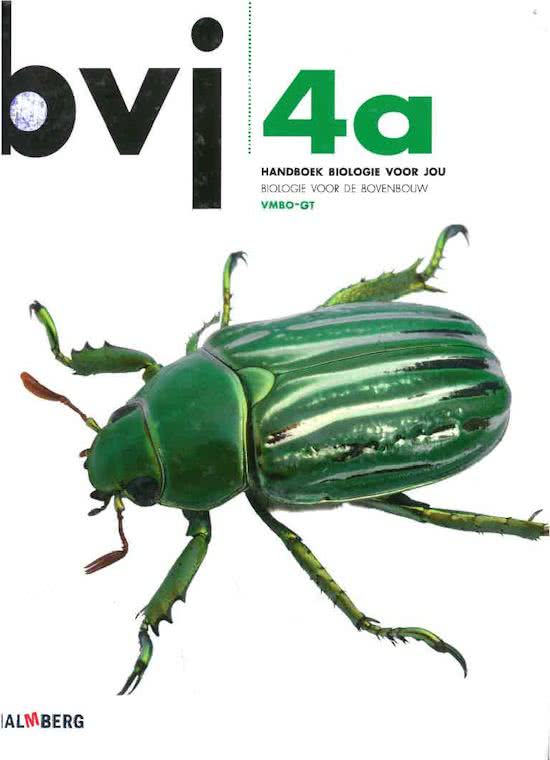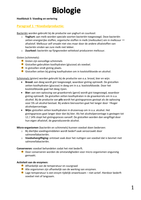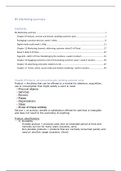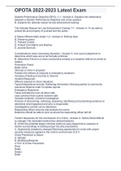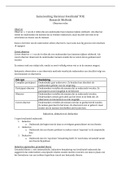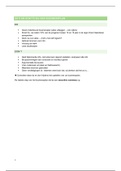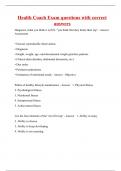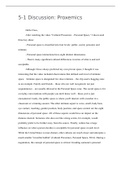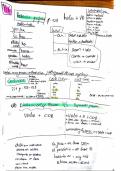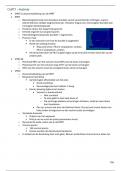Hoofdstuk 5: Voeding en vertering
Paragraaf 1 ➙Voedselproductie:
Bacteriën worden gebruikt bij de productie van yoghurt en zuurkool:
o Yoghurt: aan melk worden speciale soorten bacteriën toegevoegd. Deze bacteriën
zetten energierijke stoffen, organische stoffen in melk (melksuiker) om in melkzuur ➙
afvalstof. Melkzuur zelf smaakt niet vies maar door de andere afvalstoffen van
bacteriën vinden we zure melk niet lekker.
o Zuurkool: bacteriën op fijngesneden wittekool produceren melkzuur.
Gisten (schimmels):
Gisten zijn eencellige schimmels
Gistcellen gebruikten koolhydraten (glucose) als voedsel.
In gistcellen vindt gisting plaats.
Gistcellen zetten bij gisting koolhydraten om in koolstofdioxide en alcohol.
Schimmels (gisten) worden gebruikt bij de productie van o.a. brood, bier en wijn:
Brood: aan deeg wordt gist toegevoegd, waardoor gisting optreedt. De gistcellen
zetten koolhydraten (glucose) in deeg om in o.a. koolstofdioxide. Door het
koolstofdioxide gaat het deeg rijzen.
Bier: aan een oplossing van graankorrels (gerst) wordt gist toegevoegd, waardoor
gisting optreedt. De gistcellen zetten koolhydraten in de graankorrels om in o.a.
alcohol. Bij de productie van pils wordt het gistingsproces gestopt als de oplossing
voor 5% uit alcohol bestaat. Bij andere biersoorten gaat het langer door ➙hoger
alcoholpercentage.
Wijn: gistcellen zetten koolhydraten in druivensap om in o.a. alcohol. Het
gistingsproces gaat langer door dan bij bier. Als het alcoholpercentage is gestegen tot
% stopt het gistingsproces vanzelf. De gistcellen worden dan vergiftigd door
hun eigen afvalstof, de geproduceerde alcohol.
Micro-organismen (bacteriën en schimmels) kunnen voedsel doen bederven:
o Bij dierlijke voedingsmiddelen wordt bederf vaak veroorzaakt door
salmonellabacteriën.
o Voedselvergiftiging: ontstaat vaak door het nuttigen van voedsel dat is besmet met
salmonellabacteriën.
Conserveren: voedsel behandelen zodat het niet bederft.
Door conserveren worden de omstandigheden voor micro-organismen ongunstig
gemaakt.
Activiteit van de enzymen:
Afhankelijk van de temperatuur en zuurgraad
Alle organismen zijn afhankelijk van de werking van enzymen.
Lage temperatuur is een enzym tijdelijk onwerkzaam – niet actief. Hierdoor bederft
voedsel niet of langzaam.
1
Paragraaf 1 ➙Voedselproductie:
Bacteriën worden gebruikt bij de productie van yoghurt en zuurkool:
o Yoghurt: aan melk worden speciale soorten bacteriën toegevoegd. Deze bacteriën
zetten energierijke stoffen, organische stoffen in melk (melksuiker) om in melkzuur ➙
afvalstof. Melkzuur zelf smaakt niet vies maar door de andere afvalstoffen van
bacteriën vinden we zure melk niet lekker.
o Zuurkool: bacteriën op fijngesneden wittekool produceren melkzuur.
Gisten (schimmels):
Gisten zijn eencellige schimmels
Gistcellen gebruikten koolhydraten (glucose) als voedsel.
In gistcellen vindt gisting plaats.
Gistcellen zetten bij gisting koolhydraten om in koolstofdioxide en alcohol.
Schimmels (gisten) worden gebruikt bij de productie van o.a. brood, bier en wijn:
Brood: aan deeg wordt gist toegevoegd, waardoor gisting optreedt. De gistcellen
zetten koolhydraten (glucose) in deeg om in o.a. koolstofdioxide. Door het
koolstofdioxide gaat het deeg rijzen.
Bier: aan een oplossing van graankorrels (gerst) wordt gist toegevoegd, waardoor
gisting optreedt. De gistcellen zetten koolhydraten in de graankorrels om in o.a.
alcohol. Bij de productie van pils wordt het gistingsproces gestopt als de oplossing
voor 5% uit alcohol bestaat. Bij andere biersoorten gaat het langer door ➙hoger
alcoholpercentage.
Wijn: gistcellen zetten koolhydraten in druivensap om in o.a. alcohol. Het
gistingsproces gaat langer door dan bij bier. Als het alcoholpercentage is gestegen tot
% stopt het gistingsproces vanzelf. De gistcellen worden dan vergiftigd door
hun eigen afvalstof, de geproduceerde alcohol.
Micro-organismen (bacteriën en schimmels) kunnen voedsel doen bederven:
o Bij dierlijke voedingsmiddelen wordt bederf vaak veroorzaakt door
salmonellabacteriën.
o Voedselvergiftiging: ontstaat vaak door het nuttigen van voedsel dat is besmet met
salmonellabacteriën.
Conserveren: voedsel behandelen zodat het niet bederft.
Door conserveren worden de omstandigheden voor micro-organismen ongunstig
gemaakt.
Activiteit van de enzymen:
Afhankelijk van de temperatuur en zuurgraad
Alle organismen zijn afhankelijk van de werking van enzymen.
Lage temperatuur is een enzym tijdelijk onwerkzaam – niet actief. Hierdoor bederft
voedsel niet of langzaam.
1

